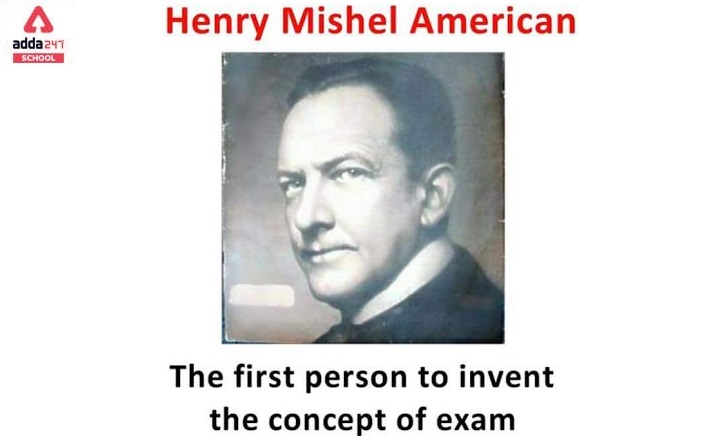Who Invented Exams in World?
Who invented exams?-Exams were invented in the late 1800s by an American businessman named Henry Fischel. China held the first exam and was the first country to adopt the notion of exams. China’s first examination was known as the Imperial Examination. Examining a subject entails observing, assessing, inspecting, or studying it. These are done by subject matter experts, scientists, or researchers. Exams are commonly used in today’s society to measure people’s understanding of a certain subject.
Henry Fischel is the Person Who Invented Exams
- Imperial Examination- The history of exams is different all around the world. The first country to accept the concept of exams was China. The government organized an assessment known as the Imperial Examination. The exam was introduced by the Sui dynasty. This exam was to assess the potential candidates by merit and if the candidates qualified for the exams they were given a chance to be a part of government officials groups under the leadership of Emperor Yang of Sui.
- Civil services exam- England followed this and adopted the examination system in 1806. The examination was to assess the potential candidates to serve in Her Majesty’s Civil Service.
- Cambridge Assessment- In the late 19th century Universities like Oxford and Cambridge were approached by England to make tests a standardized process for males in the country. On December 14, 1958, the first Cambridge Assessment was taken by the students in schools and churches. The subjects included were English, mathematics, history, Latin, German, French, Latin, and geography.

Who Invented Exams in India?
In 1853, exams were introduced in India. Earlier, the civil servants were appointed by the East India Company directors, which was also based on nominations. In 1853, the Parliament of England abolished the system of nominations. Therefore, the civil servants were selected based on exams. Every year, the exams were conducted in London.
The candidates were also required to pass the horse-riding test which was a compulsory part of the examination. The downfall of the East India Company led to the rise of the British Civil Service which took over the responsibilities. The Indian civil service exams were conducted simultaneously in both India and England, which was achieved after the implementation of social reforms Like the Public Service commission and the house of commission resolution.
Types of Exams
There are several exams in India for every job, institute, or organization. Few exams are conducted by the government and few of them are conducted by private organizations. In any educational sector like school, the important exams are higher secondary and senior secondary exams. There are competitive exams for further studies and to get into our desired college. There are different exams for private and government exams. The most common examples are Joint Entrance Exam (JEE) for engineering, and the National Entrance cum Eligibility Test (NEET). There are many other types of exams which are listed below.
- Civil Services examination– It is a national-level competitive examination in India. It is the top civil service of the Government of India. The candidates who qualify for the test are given various posts or ranks in Indian Foreign Service (IFS), Indian Police Service (IPS), Indian Administrative Service (IAS), etc. It is conducted by UPSC.
- SSC– Staff selection commission, It is a national level examination conducted once a year in four stages. Tier I, II, III, and IV. SSC recruits for several government posts like railways, the Ministry of External Affairs, etc.
- NDA– National Defence Academy Examination, Conducted for recruitment of candidates for Army, Navy, and air force. Candidates with subjects like physics, chemistry, and mathematics in their graduation can apply for the examination. This exam is also conducted by UPSC.
- JEE– Joint Entrance Examination, is a national-level examination conducted by the National Testing Agency. Candidates can take this test for taking admission to various engineering and architecture courses in India.
- NEET– National Eligibility cum Entrance Test, It is conducted all over India for the candidates to take admission in various MBBS/BDS courses. This test is conducted once a year. The candidates with Biology, chemistry, physics, and English in their 12th can apply for these exams.
- CEED– Common Entrance Examination for Design, Conducted by IIT Bombay once a year. Candidate with a graduate degree in BE/B.Tech/B.Arch can apply for these exams. The candidates qualified for this exam can enroll for a Master’s degree in Design and Ph.D.
- CAT– Common Admission Test, is a national level examination that is conducted once a year. It is conducted by the India Institute of Management for admission
- GATE– Graduate Aptitude Test in Engineering, It is conducted for admissions into various engineering courses including undergraduate and post-graduate. It is one of the toughest exams in India.
Who Invented Study
The concept of “study” as a deliberate effort to acquire knowledge has evolved over millennia and cannot be attributed to a single inventor. However, we can trace its development through different civilizations and key figures in history:
- Ancient Civilizations:
- Mesopotamia and Ancient Egypt: The earliest known schools appeared in these regions around 3000 BCE. They taught writing, mathematics, and other subjects to young scribes.
- Ancient Greece: The Greeks emphasized philosophy and the pursuit of knowledge. Socrates, Plato, and Aristotle are some of the key figures who contributed significantly to the methods and purposes of study.
- Classical Period:
- Confucius (551-479 BCE) in China stressed the importance of education and personal development, which greatly influenced Chinese culture and educational practices.
- Plato (428-348 BCE): Founded the Academy in Athens, one of the earliest institutions of higher learning in the Western world.
- Aristotle (384-322 BCE): Studied at Plato’s Academy and later founded his own school, the Lyceum. His work in logic, science, and philosophy laid the groundwork for many areas of study.
- Medieval Period:
- Monastic Schools and Universities: During the Middle Ages, monastic schools preserved and taught classical knowledge. The first universities, such as the University of Bologna (1088), University of Paris (c. 1150), and University of Oxford (1096), began to formalize higher education.
- Renaissance and Enlightenment:
- Humanism: Focused on the study of classical texts and human potential, leading to advancements in arts and sciences.
- Scientific Revolution: Figures like Galileo Galilei and Isaac Newton formalized methods of empirical study and scientific inquiry.
The evolution of study is a collective development influenced by various cultures, educators, philosophers, and scientists over thousands of years. Each period and individual contributed to the methods and importance of study in human societies.









 CUET Agriculture Syllabus 2026, Pattern,...
CUET Agriculture Syllabus 2026, Pattern,...
 CUET Maths Syllabus 2026 PDF Download - ...
CUET Maths Syllabus 2026 PDF Download - ...
 CUET Physics Syllabus 2026 for PCB and P...
CUET Physics Syllabus 2026 for PCB and P...














